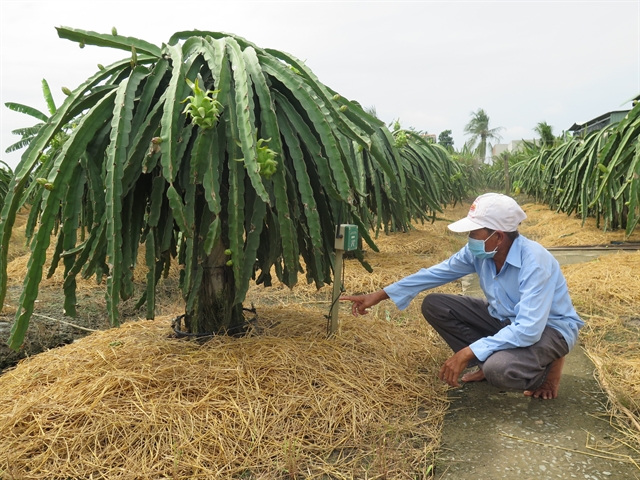 Society
Society

 |
| A dragon fruit orchard in Long An Province’s Châu Thành District equipped with automatic irrigation and humidity measurement systems. — VNA/VNS Photo Minh Hưng |
LONG AN — The Cửu Long (Mekong) Delta province of Long An plans to expand hi-tech farming of rice, dragon fruit, lime, vegetables, cattle, and brackish-water shrimp this year.
It will focus on meeting export requirements and adopt Vietnamese and global good agricultural practices (VietGAP and GlobalGAP) standards, according to its Department of Agriculture and Rural Development.
The department will work with local authorities to improve the functioning of 126 co-operatives and set up six new ones and 66 co-operative groups for hi-tech farming this year.
It will publicise its preferential policies for developing the collective economy and improve the capacity of managers and members of co-operatives, help them adopt advanced agricultural techniques and develop linkages with other stake-holders, invest in infrastructure such as roads, electricity networks and irrigation works for hi-tech farming.
It will assist individuals, co-operatives and companies with accessing trade promotion activities.
The province plans to increase the area under hi-tech farming of rice to 60,000ha, of dragon fruit to 6,000ha, of vegetables to 2,000ha, of lime to 3,000ha, and of brackish-water shrimp to 100ha by 2025, according to the department.
It had 30,000ha, 4,000ha, 1,800ha, 295ha and 10h respectively as of last year.
By 2025 it also plans to have seven dedicated areas for rice and one each for lime and dragon fruit that meet export requirements.
It wants hi-tech farms to yield at least 10 per cent higher incomes than normal farming areas.
As one of the delta’s largest dragon fruit producing provinces, Long An has most of its hi-tech orchards in Châu Thành and Tân Trụ districts and Tân An City.
It has developed a number of models for growing dragon fruit to VietGAP standards for farmers in the three localities.
Last year it developed three such models.
Farmers who participate are provided 50 per cent subsidies for fertilisers and bio-products.
The province issued 140,000 geographical indication stamps to co-operatives last year for Châu Thành dragon fruit, one of its many speciality agricultural produce along with Tài Nguyên rice, Chợ Đào fragrant rice and Cần Giuộc vegetables.
Many farmers in the province have also switched to use organic fertilisers to improve quality and efficiency.
Nguyễn Văn Út in Bến Lức District’s Lương Hoà Commune has been using organic fertilisers on his 0.7ha lime orchard for the last three years.
The trees grow well, do not suffer much from diseases and have a high fruiting rate, he said.
“The use of organic fertilisers helps lime trees develop sustainably and reduce costs since the price of chemical fertilisers is high,” he said.
Farmers can themselves make organic fertilisers from agricultural by-products, animal manure and other natural materials.
Nguyễn Văn Cơ, deputy director of the Bến Lức Agriculture Service Centre, said when farmers use organic instead of chemical fertilisers they get higher prices for their produce and also help protect the environment.
“The district plans to increase the use of organic fertilisers to enhance quality and also rejuvenate the ecology, which has been affected by the overuse of chemical fertilisers.” — VNS




